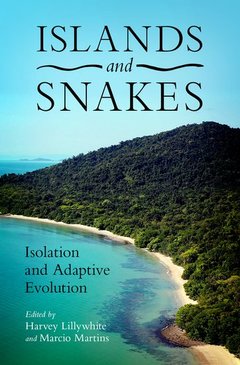Description
Islands and Snakes
Isolation and Adaptive Evolution
Coordinators: Lillywhite Harvey, Martins Marcio
Language: English
Subject for Islands and Snakes:
Publication date: 08-2019
376 p. · 16.1x24.3 cm · Hardback
376 p. · 16.1x24.3 cm · Hardback
Description
/li>Biography
/li>
Islands and Snakes contains 13 chapters describing ecological systems with foci on snakes and their ecological roles on islands around the world. Each chapter is written by one or more authors who is an authority on that particular system. Summaries of research on the various islands are written in a narrative manner that includes science as well as personal insights in easily understood language. These varied vignettes of science feature islands around the world, and in all cases, fantastic species of snakes and their roles in the community of insular organisms in which they occur. Both challenges and opportunities associated with island life are discussed, as well as the unique attributes of snakes and their conservation as unique and important parts of nature. Chapters include colorful photographs and illustrations, and collectively they convey information on topics that include ecology, behavior, biogeography, physiology, adaptation, and evolutionary biology. An introductory chapter presents a review and perspective on the historical importance of island ecology and how snakes have contributed to our understanding of evolution and adaptation. The other chapters focus on snakes inhabiting islands associated with Asia, Australia, South America, North America, the Caribbean, and Europe. The final chapter features the unique "table top islands" or tepuis of South America as examples of ecological islands where elements of biota have become isolated by geographic features of landscape similarly to oceanic islands.
Harvey B. Lillywhite is a Professor of Biology at the University of Florida, Gainesville. He has published numerous scientific articles on snakes, including those living on islands in many parts of the world. His research has been featured in Science, Nature, Scientific American, Natural History, Proceedings of the Royal Society, and many other publications. He is author of the book How Snakes Work, published by Oxford University Press in 2014. Marcio Martins is a Professor of Ecology at the University of São Paulo, Brazil. He has published numerous scientific articles on the natural history, ecology, evolution and conservation of frogs and snakes, including studies on island snakes from Brazil and Mexico. His research has been featured in Nature Ecology & Evolution, Biological Conservation, Global Ecology and Biogeography, Oecologia, Proceedings of the Royal Society, and many other publications.
© 2024 LAVOISIER S.A.S.




